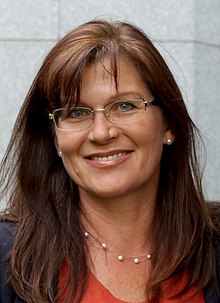Kate Lundy
Kate Lundy | |
|---|---|
 Lundy in 2013 | |
| Minister for Multicultural Affairs | |
| In office 5 March 2012 – 18 September 2013 | |
| Prime Minister | Julia Gillard Kevin Rudd |
| Preceded by | Office Created |
| Succeeded by | Michaelia Cash |
| Minister for Sport | |
| In office 5 March 2012 – 1 July 2013 | |
| Prime Minister | Julia Gillard |
| Preceded by | Mark Arbib |
| Succeeded by | Don Farrell |
| Senator for the Australian Capital Territory | |
| In office 2 March 1996 – 24 March 2015 | |
| Preceded by | Bob McMullan |
| Succeeded by | Katy Gallagher |
| Personal details | |
| Born | 15 December 1967 Sydney, New South Wales, Australia |
| Political party | Australian Labor Party |
| Residence(s) | Canberra, Australian Capital Territory |
| Website | www |
Kate Alexandra Lundy (born 15 December 1967) is an Australian former politician. She was a Labor Party member of the Australian Senate, representing the Australian Capital Territory. Lundy served as the Minister for Multicultural Affairs and the Minister Assisting for the Digital Economy in the Second Rudd Ministry;[1][2] having previously served as the Minister for Sport and the Minister Assisting the Minister for Industry and Innovation.
Background and early career
[edit]Born in Sydney, Lundy left school without completing Year 11 and did not tell her parents.[3] She went to work on a construction site. She became the trade union representative and began her career in the Building Workers' Industrial Union.[3]
Political career
[edit]
In 1996, aged 28, Lundy became the youngest woman from the Australian Labor Party to be elected to the federal parliament;[4] since superseded by Kate Ellis. She replaced Bob McMullan in the Senate when he moved to a lower house seat in that year's election.
After the 1998 Australian federal election, Lundy was made Shadow Minister for Sport and Youth Affairs and Shadow Minister Assisting the Shadow Minister for Industry and Technology on Information Technology. In 2001, she became Shadow Minister for Information Technology and Sport. She added the Arts and Recreation to her responsibilities in 2003 after Mark Latham became federal Labor leader. She was Shadow Minister for Manufacturing and Consumer Affairs from October 2004 to June 2005, when she was appointed Shadow Minister for Sport and Recreation. With the election of Kevin Rudd as Leader of the Parliamentary Labor Party in December 2006, the responsibilities of Health Promotion and Local Government were added to Lundy's responsibilities for Sport and Recreation.[citation needed]
Following the 2007 federal election, Lundy was replaced by Kate Ellis, who was appointed as Minister for Sport and Minister for Youth.
On 11 September 2010, Lundy was appointed Parliamentary Secretary for Immigration and Citizenship as well as Parliamentary Secretary to the Prime Minister and Cabinet as part of the original Second Gillard Ministry.[5] In a subsequent reshuffle in March 2012, Lundy was appointed as the Minister for Sport following the retirement of Senator Mark Arbib, and she was also made Minister for Multicultural Affairs, and Minister Assisting the Minister for Industry and Innovation.[6] On 1 July 2013, as part of the Second Rudd Ministry, Lundy retained the portfolio of Multicultural Affairs and gained the portfolio of Minister Assisting for the Digital Economy. Don Farrell was appointed as Minister for Sport.[1][2]
Lundy is a member of the Socialist Left faction of Labor.[citation needed] She has been highly active on the issue of internet regulation, arguing against both the Howard government's and her own party's policy in that area. Lundy is also patron of the Canberra Rowing Club[3][7] and the Pearcey Foundation.[8]
On 26 November 2014, Lundy announced that she would not stand for re-election at the 2016 federal election.[4] She resigned from the Senate on 24 March 2015, and the next day former ACT Chief Minister Katy Gallagher was appointed as her replacement by the ACT Legislative Assembly.
Awards
[edit]In 2010, Lundy won the International Top 10 People Changing the World of Internet and Politics at the 11th World eDemocracy Forum which was held in Paris, France.[9][self-published source]
See also
[edit]References
[edit]- ^ a b "Second Rudd Ministry" (PDF). Department of Prime Minister and Cabinet. Commonwealth of Australia. 5 July 2013. Retrieved 2 July 2013.[permanent dead link]
- ^ a b "Kevin Rudd's new-look ministry". ABC News. 1 July 2013. Retrieved 1 July 2013.
- ^ a b c "Senator Kate Lundy". Q&A. Australian Broadcasting Corporation. Retrieved 24 February 2010.
- ^ a b Thorpe, Clarissa (26 November 2014). "Canberra-based senator Kate Lundy to retire at next federal election". ABC News. Retrieved 26 November 2014.
- ^ "Communications Minister, Stephen Conroy, gets promoted with more responsibilities". ARN. IDG Communications. Retrieved 11 September 2010.
- ^ "Lundy the perfect fit as sports minister". Business Spectator. AAP. 2 March 2012. Retrieved 5 March 2012.
- ^ "About Us". Canberra Rowing Club. Retrieved 28 October 2007.
- ^ "Pearcey Foundation". Pearcey.org.au. 20 September 2011. Retrieved 27 June 2012.
- ^ "Senator Lundy wins International Top 10 People Changing the World of Internet and Politics". Kate Lundy. 18 October 2010. Archived from the original on 22 March 2012. Retrieved 27 June 2012.[self-published source]
External links
[edit]![]() Media related to Kate Lundy at Wikimedia Commons
Media related to Kate Lundy at Wikimedia Commons
- Australian Labor Party members of the Parliament of Australia
- Labor Left politicians
- Members of the Australian Senate
- Members of the Australian Senate for the Australian Capital Territory
- Australian bloggers
- Women members of the Australian Senate
- 1967 births
- Living people
- Delegates to the Australian Constitutional Convention 1998
- 20th-century Australian politicians
- Women government ministers of Australia
- Australian women bloggers
- 20th-century Australian women politicians
- 21st-century Australian politicians
- 21st-century Australian women politicians
- Government ministers of Australia

